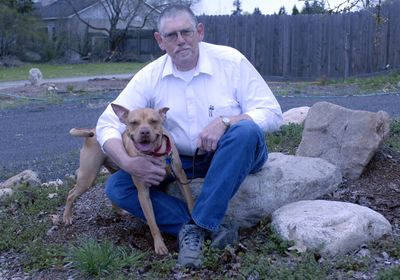Group educates pet owners
Nonprofit offers free spaying, neutering in effort to reduce animal euthanasias

Maggie changed Dan Storie’s life. He first saw her lying in a kennel in an Oklahoma City animal shelter in 1993, and adopted the mixed-breed dog that very night. She wasn’t considered a likely candidate for adoption because people terrified her. But Storie saw something in Maggie’s eyes and he brought her home.
“I took her to obedience classes and she just blossomed and came out of her shell,” he said, smiling at the memory. And the dog that once cowered from human contact became a therapy dog, visiting retirement facilities and nursing homes with her owner.
“Maggie got me into volunteering,” Storie said. He worked at an animal shelter, but what he saw there horrified him. “In Oklahoma City they take in about 30,000 animals a year, but about half of them never make it out.” The bodies of the euthanized animals are transported by the truckload to a landfill. “I said, ‘We’ve got to do something,’ ” Storie recalled.
The solution should have been simple. Thirty years earlier, a massive campaign had educated communities about the importance of spaying and neutering their pets. This public-awareness emphasis resulted in a dramatic decline in animals being put down in shelters. However, by the mid-’90s the number of animals being euthanized plateaued at about 4 to 5 million per year.
A recent study from the Humane Society of the United States found that cost and lack of motivation/education are the two biggest barriers to having pets altered. Storie, who moved to Spokane with his wife in 2004, is committed to toppling those two obstacles.
He’s launched Community Pets, a nonprofit organization dedicated to reaching people who are either financially unable or simply uninformed about the benefits of spaying and neutering their animals. Storie said, “I tell people Community Pets is primarily a people organization. We’re trying to create space for people to become better pet owners.”
Using the Montana Spay/Neuter Task Force as a model, Storie plans to hold a spay and neuter event, offering these services at no charge to the community. According to the Montana Task Force Web site, the effect of these events is dramatic. Statistics reveal that in larger urban areas, the immediate impact is about a 19 percent drop in animals impounded and about a 24 percent drop in animals destroyed. In addition, dog bites decrease by 33 percent.
“It’s community involvement that makes the change,” Storie said. These events are typically held in schools or fire stations. A small van travels to the site carrying supplies and equipment. Licensed veterinarians perform the surgeries, but pet owners themselves get involved. Unlike the clinic setting, the traveling event allows owners to assist during surgery, under the supervision of trained technicians.
This intimate participation often changes the dynamic between people and their animals. “The act of caring for their pets improves the relationship with owners and pets,” said Storie. “They’ve got something that has more value than it had before.”
That component garnered the support of Dr. Brian Hunter, president of the Inland Empire Veterinary Medical Association. He sees these events as an opportunity for education, because the pet owners are involved in the process.
In the past, communities have offered spay/neuter vouchers, but Hunter said such programs haven’t been successful in reaching low-income families. “Pet overpopulation is always at the forefront of every city’s problem list,” he said. But he doesn’t see the value in asking people who are truly low-income to come up with money for a license in order to receive a voucher. “These pets don’t see vets. It’s not in the family budget.”
Hunter said the Community Pets program “is a great idea. The program goes to where people live.” He also believes the right kind of advocate like Dan Storie can make all the difference. “It takes a passionate person to get the word out.”
The organization is in the final stages of preparing for its maiden event, but help is still needed. “We want the community to pull together and do the work,” Storie said.
The Montana Spay/Neuter Task Force will lend the equipment for the first event, and local veterinarians have pledged their services. Now, the group is raising funds for additional expenses. Board member Terri Hansen said, “The goal is to empty the shelters.”
Storie agreed, saying he hopes Community Pets will improve the lives of both pets and people. “Better pet owners make a better community,” he said.